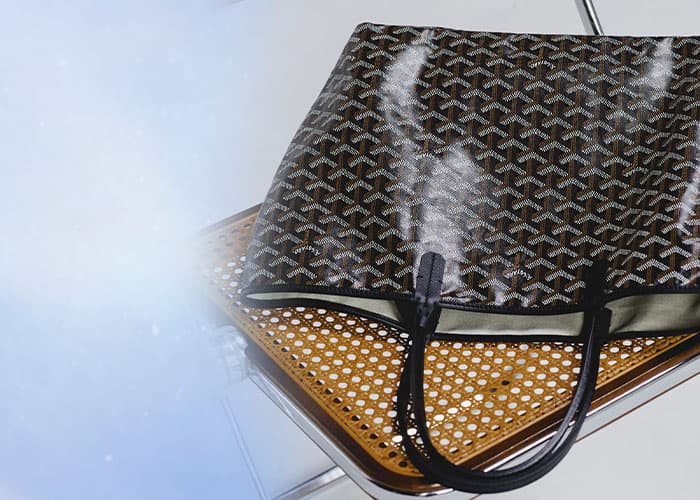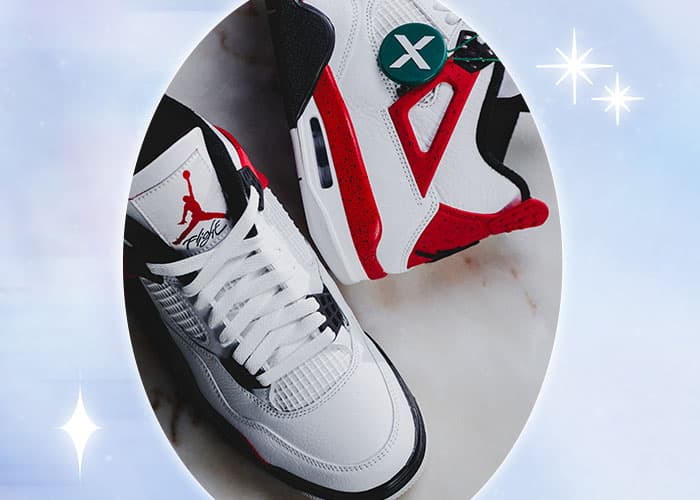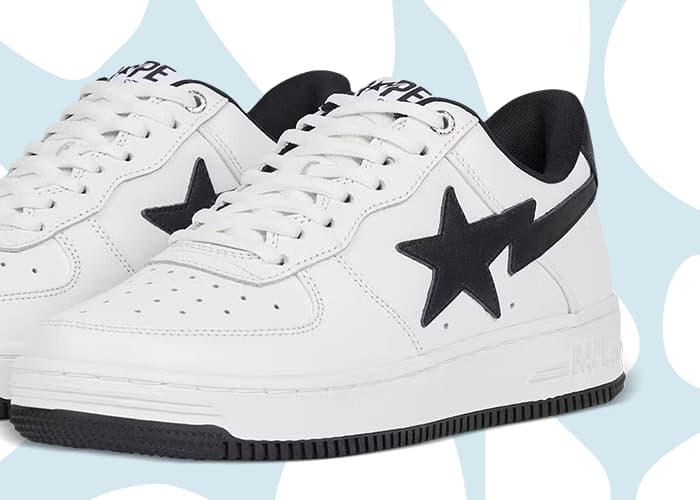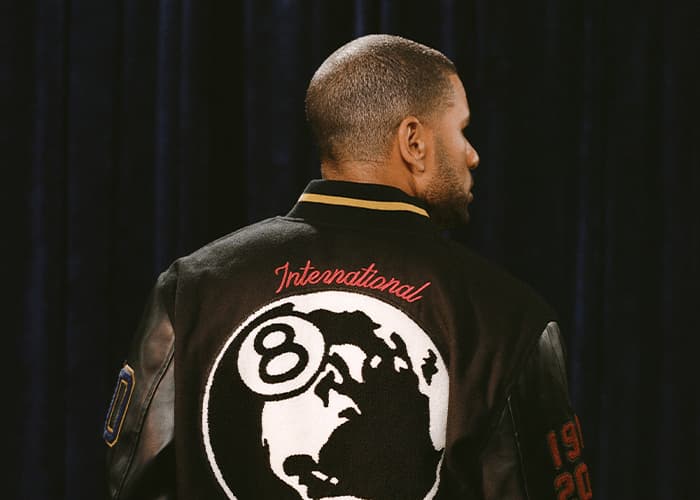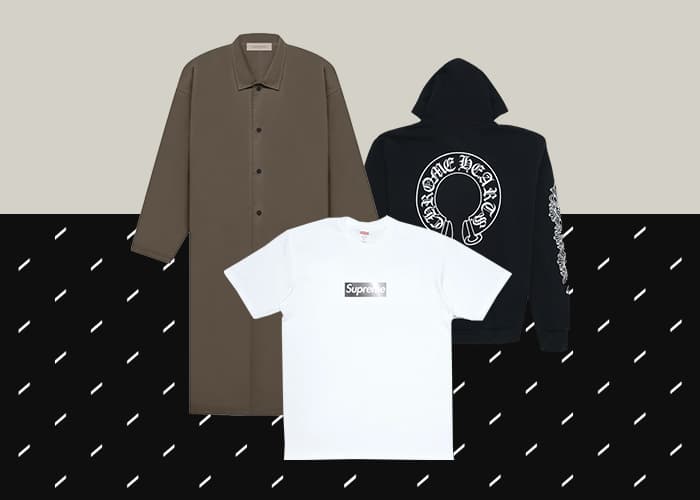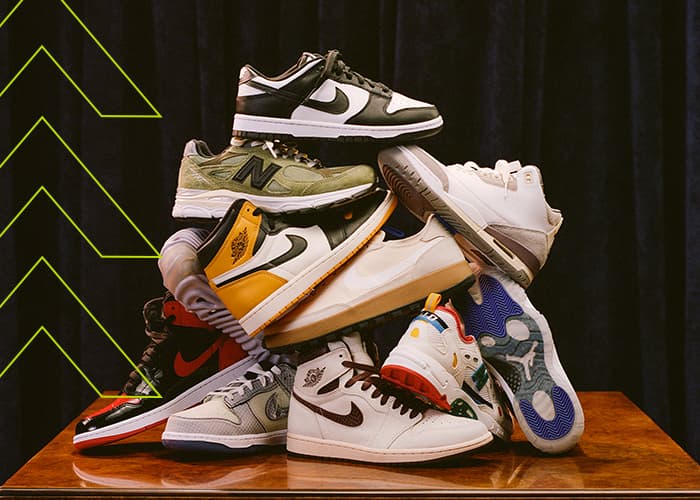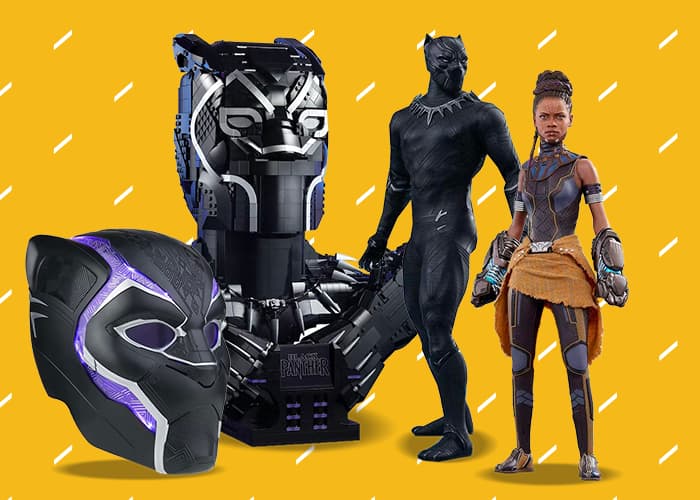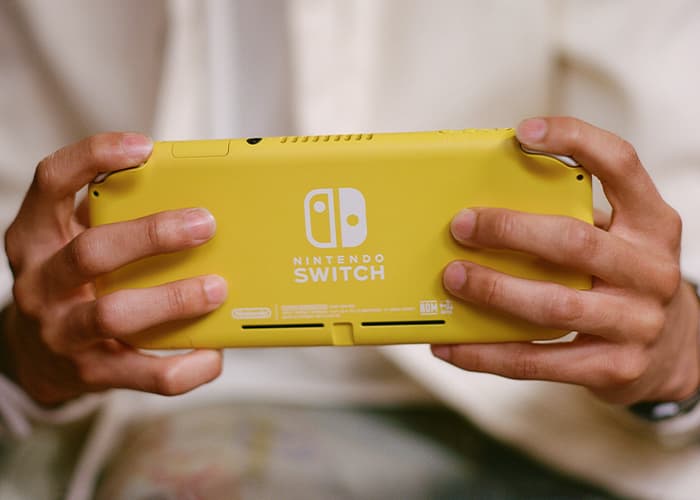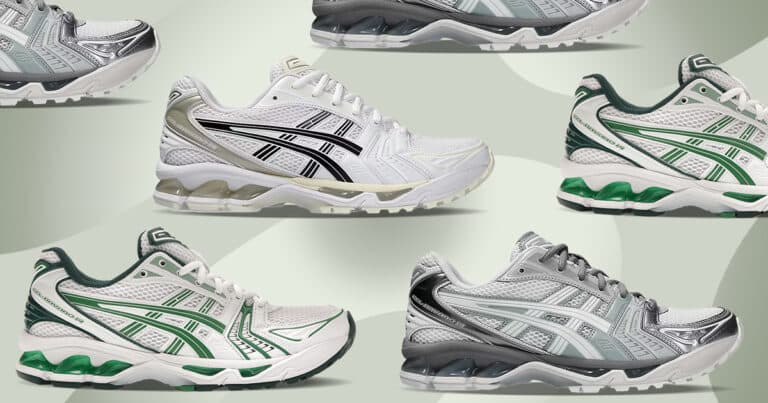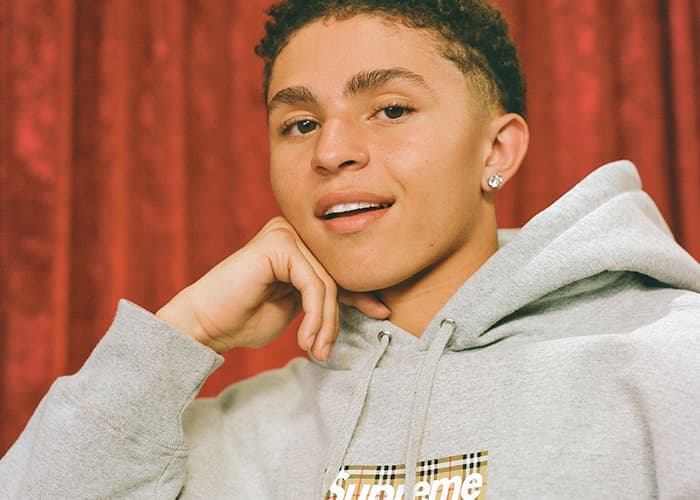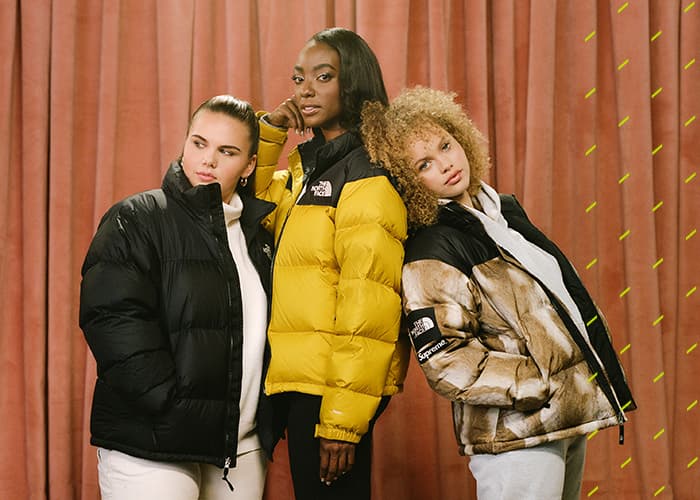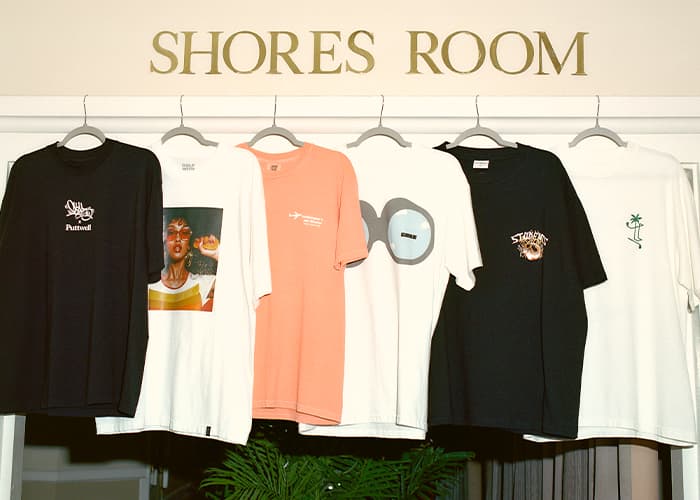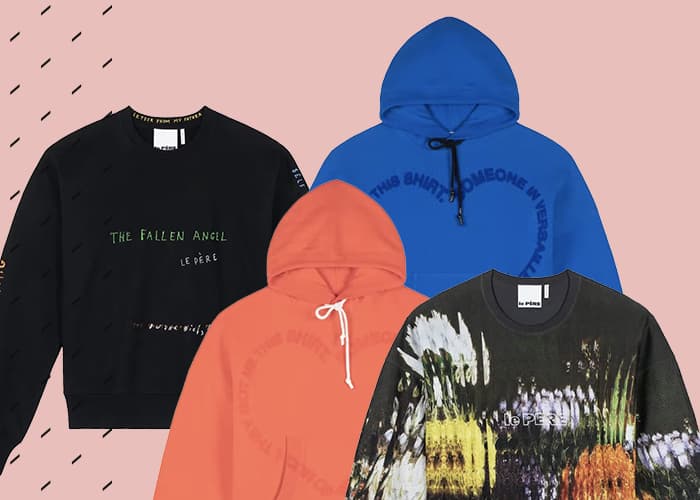Disclaimer: Leah’s opinions are her own and do not reflect the beliefs of StockX or its Team Members.
The name may not mean much to newcomers, but anyone following streetwear for longer than five years knows exactly who Married To The Mob (MTTM) is, and probably recognizes the name Leah McSweeney too. Leah founded Married To The Mob in 2004 and the brand’s fifteen-year story since then has been nothing less than fascinating. Between collaborating with giant and iconic brands (Nike, Reebok, KAWS) to partnering with high fashion’s most astute tastemakers like Colette (RIP) and others, McSweeney’s seemingly done it all, including stepping on the toes of streetwear’s most high: Supreme.
In 2013, Supreme filed a lawsuit against Married To The Mob for copyright infringement – one of the first large, public legal disputes in Supreme’s history. The subject of the lawsuit was MTTM’s line of “Supreme Bitch” t-shirts and apparel, which, according to Supreme, constituted an illegal use of their logo. In response, Leah McSweeney filed her own countersuit, “alleging that the power of unchecked capitalism was used to block free speech”, per a report from Complex. Both lawsuits were eventually dropped on the terms that MTTM would no longer use the word “Supreme” in their font in a red box. Since then, MTTM has released the shirts that omit the word “Supreme”, and carry only the word “Bitch” in the classic white Futura font and red box. In this exclusive StockX interview, McSweeney discusses her history with Supreme, the MTTM brand, and her thoughts on the wider streetwear industry. Read the complete interview below:
StockX: Tell us how Married To The Mob came to be…
Leah: I had no plans or Ambitions to have my own brand, I wanted to be an actress. I always loved fashion but I never really saw it like, “oh I want to work with in the fashion world.” When I was like 18 or 19, I started interning at Mass Appeal with the fashion director there, and from there I started doing assisted styling work which I hated. I hated it. It was demoralizing, dehumanizing. I was like, “This is disgusting. I never want to work for someone.” I was like “This isn’t for me. I can’t kiss people’s asses”.
“I had never even heard the term ‘streetwear’. I didn’t even know what people were talking about.”
I started dating a guy named Rob [Cristofaro] and he owned a brand called Alife. I knew about Alife before I started dating him; I grew up in the city, shopping on Lafayette Street and going to Supreme, I remember when it opened. It was like the epicenter down there, like the best stuff you could get. So fast forward, I started dating Rob and we had our own little crew. I guess being around [these guys], I was like “I’m just as smart as them. If they can do it, I can do it. If they can make t-shirts and put logos on them and come up with kitschy sayings and play on other people’s logos, I can do the same thing.” And what I thought was so impressive was that they got to travel for free. That was the coolest thing to me because I had been to Europe once at that point and I saw Paris and I went to Copenhagen and I fell in love with it out there. And I’m like “I need money. I need to travel.” And these guys are getting free trips just for having these brands and so I’m like “I need to start my own brand”. That’s basically how it happened and I have it’s honestly kind of crazy how it’s been 15 years.
At that moment in time, in 2004, I realized people all over the world were looking at New York Downtown to see what we were doing. They really wanted to know what we were wearing. For that reason, Mob was really able to flourish, it was the perfect timing. People didn’t even care if you owned the brand, it was like if you work with Supreme you were famous to them. That was kind of the feeling that was going on in those early years of like hypebeasts and streetwear… I had never even heard the term ‘streetwear’. I didn’t even know what people were talking about.
View this post on Instagram
StockX: Married To The Mob is unapologetic in creating streetwear by and for women. The streetwear industry has largely ignored women. How have things changed since 2004 to 2019?
Leah: This is how it’s changed… God, I’m gonna sound like such an old, grumpy bitch. Put that in there. Use that. Here’s the thing; for me, feminism right now is at an all-time low for me. This is not my brand of feminism. This is a victim-centric, anti-sex, anti-empowerment feminism that’s taking over many young women right now and that is not at all what Mob is about. It’s never been about that. It would and never will be about that. So I don’t know, I wish there were more young women who were unapologetically powerful right now but they’re just kind of not. Like, you’re crying over bullshit. What is bold anymore anyways? What is bold? There are so many brands now. Anyone can have a brand because of social media. Which is a great thing but it also destroys a lot of the authenticity. You have a dude that’s calling himself a feminist ally and putting “feminist” on a t-shirt and then he’s doing God-knows-what at the office, and this is a true story where this happened. That should be a red flag because it’s a dude and it’s a brand that’s making money off of feminism.
Things are definitely different now than they were back then. Everyone’s offended by everything, no one has a sense of humor, and no one understands satire. So much of Mob was this irreverence because that’s just who I am and I feel like everyone is the opposite of that now. That’s not the type of feminist that I am.
StockX: It sounds like if you were to try and start Mob today, it would be impossible.
Leah: Oh yeah. It would. That’s why there’s been no one else. Not to say there’s no one else but there really have not been that many. If you think about how many men’s brands there have been, there’s a lot. There’s not a lot of female brands.
“As much as people hate on them, every single brand has looked at Supreme and been like “I want to do things like that” in whatever way.”
StockX: So as an industry, do you see streetwear moving forward to be more inclusive of women?
Leah: I don’t know. I feel like we’re just different consumers. I just feel like we’re so different from men, and we shop so much different than men, and different things are important to us than men. I think we’re always going to be spending our money on bags and shoes and we’re not going to be as brand loyal to our clothing. With men, it’s the brand. With women, it’s not. We just want the jeans that make our butts look good. I don’t care what the brand is. Just make my ass look good! It’s different, we’re just different types of consumers. We also don’t have it in our DNA to stand in line for a shirt or sneaker. We’re probably more evolved than that. I’ve honestly tried to really figure it out.
In terms of streetwear, I think streetwear people say they want to care about the female and the female consumer and blah blah blah, but then they don’t. I think we saw it play out in the Nike drama. What really struck me, what was interesting to me, was that the men who are in charge of budgets, even though some of the women’s campaigns were huge, they weren’t giving them big budgets because they were for women. We’re the ones with the buying power but people still have it all messed up.
StockX: Nike recently collaborated with Yoon Ahn from Ambush and Martine Rose. Do you see Nike pandering to women after their huge scandal, or is this a step in the right direction?
Leah: I think it’s a step in the right direction. I think it’s good. I think it’s great. They (Nike) should be pandering. They should be doing all that. They should be putting so much of their money and so much of their energy into women. It just floors me that they still don’t. It’s crazy that I have to buy, like, kids’ size sneakers. It’s crazy to me.
StockX: StockX is a resale platform, and streetwear is one of our growing verticals. Do you think that the resale market in streetwear will continue to increase and is it possible to increase without a brand that is focused on women or focuses on putting women first?
Leah: Yes. I do think so. I don’t think it matters. I mean clearly, it doesn’t matter. It doesn’t matter if women are interested in it. It’s still going to be growing like it has been. I mean that’s how I feel about it.
View this post on Instagram
“I was like, “Oh, I’ve got to do ‘Supreme Bitch’ with the Supreme logo.” And yes, they OK’d it to sell it at Union and that was kind of it… until it wasn’t.”
StockX: How Did Supreme play a part in Married To The Mob’s ethos or vision at all when you were coming up?
Leah: I think they do do a lot of things amazingly, obviously. I love the way that they would take like the Louis Vuitton pattern and put it on a beanie and then just take the LV out and put an S. The way they flipped the monogram and that kind of stuff, I always loved. I use that with Mob a lot: doing a Goyard shirt; doing a Louis Vuitton shirt; I did a Chanel sweatshirt. I always loved high-end brands and melding it into Mob. I always looked at Supreme doing that and I was like, “cool.” They’re like, masters of flipping logos and appropriating big logos and making it into their own thing, which is why I did the “Supreme Bitch” shirt.
StockX: Do you mind talking a little bit about the “Supreme Bitch” shirt?
Leah: Yeah. I was like “What better?” It makes so much sense. I was listening to Lil Kim while I was coming up with the logos for Mob and happened to start listening to the song where she says “Queen bitch, supreme bitch” which I think is called “Queen Bitch.” I was like, “Oh, I’ve got to do ‘Supreme Bitch’ with the Supreme logo.” And yes, they OK’d it to sell it at Union and that was kind of it… until it wasn’t.
They set the goal posts for everyone. They always worked with the best photographers, watching how and where they spend their money and how they didn’t cut costs. They didn’t care about that. They never went to a trade show and I was like I don’t want to go to a fucking trade show either. They stayed independent for so long and they were able to do it and that’s the dream for so many people. I think everyone has been influenced by Supreme. They do it so good. As much as people hate on them, every single brand has looked at Supreme and been like “I want to do things like that” in whatever way.
StockX: What did it feel like to be on wrong side of Supreme? Was it kind of like a civil thing or was it…
Leah: No! It was not civil. It wasn’t civil. I think lawyers got involved and that’s why it wasn’t civil. Also, I was like, “You guys know me. If you come at me I’m not backing down.” Out of pure principle, I’m not going to be bullied. So that was really stupid of them.
StockX: Something that’s interesting, at least from our perspective, is that Supreme is seen as such a street, cool brand and then they put on their corporate ties and go after people for intellectual property…
Leah: Yeah, no, biggest douchebag move ever! Like are you fucking kidding me? I think it showed everybody where we were all at as a culture, like, it’s not fun and cute. Yeah, we’re doing this and it’s like, guys, we’re just what you guys have done a million times. And also, like everyone knows this is not a Supreme shirt, like what the fuck? It’s like a giant Supreme logo and it doesn’t look anything like you and you guys bit it from Barbara Kruger. There was no way that I was backing down. I was like, “Fuck this shit, I love a good fight”.
It did used to be cool. Now it’s just like a fucking joke to wear it. I mean it’s good for James [Jebbia], obviously. But it’s not like I’m going to wear a Supreme sweatshirt.
StockX: So it doesn’t really help their cool image when they put on their corporate ties, right?
Leah: Well, I think that’s what it comes down to. It’s smoke and mirrors because what makes something cool? What makes it cool? We know that they’re not cool now. What was cool about Supreme was the people that represented it, right? The guys that worked at the store but aside from that, and that was a long time ago, it’s just been sad. I don’t know. It did used to be cool. Now it’s just like a fucking joke to wear it. I mean it’s good for James [Jebbia], obviously. But it’s not like I’m going to wear a Supreme sweatshirt. I’m not letting my daughter wear a fucking Supreme sweatshirt and not because of a lawsuit but because of what it represents at this point. It used to represent like the epicenter, the coolest of the cool of New York and now it just does not represent that whatsoever.
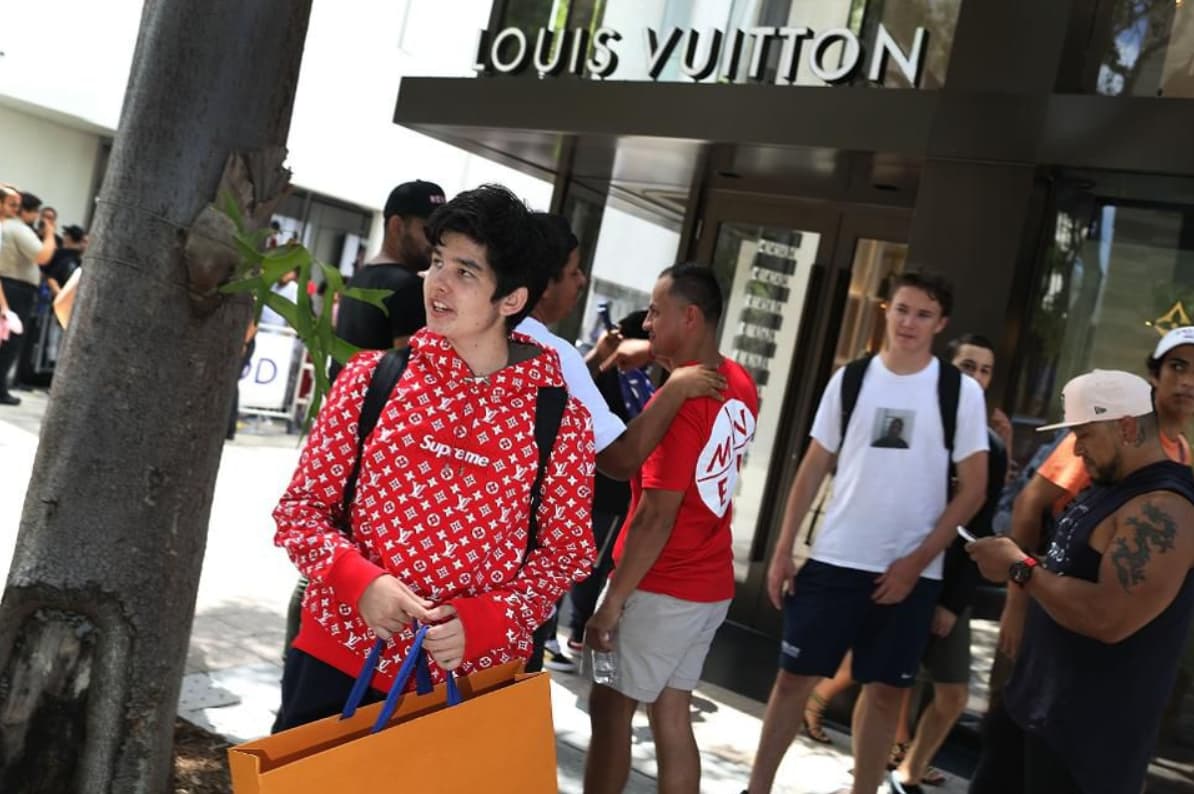
Photo by Joe Raedle/Getty Images
“It makes perfect sense that it’s the Carlyle Group. It makes perfect sense to me. But I mean, shit, you’re not going to say no to $500 million dollars, no matter who it’s from. Like totally. All those dead children? Whatever. It’s $500 million. Let’s be honest.”
StockX: In 2017, private equity firm, The Carlyle Group, purchased a $500 million stake in Supreme, raising serious questions about Supreme’s cultural credibility and brand equity. Do you feel like Supreme is headed in the wrong direction? Do you think they still have that edge?
Leah: I think that the Carlyle Group makes perfect sense for them. Aren’t they like funding a war in Syria? I mean it’s crazy when you talk about how Supreme did the “Fuck Bush” shirt and they were all like, anti-consumerism, all like, anti-corporate bullshit and all about this propaganda and all this radical shit and like it’s not this old rich white guy. But that’s him [James Jebbia]. That’s who he is and yes, it makes perfect sense that it’s the Carlyle Group. It makes perfect sense to me. But I mean, shit, you’re not going to say no to $500 million dollars, no matter who it’s from. Like totally. All those dead children? Whatever. It’s $500 million. Let’s be honest.
Personally, and I could be totally wrong, I don’t think that it’s built to last. I don’t know what their hopes and dreams were for this deal. I thought that maybe there would be more stores opening and stuff. I just can’t imagine it. I think what maybe they wanted was to be a heritage brand like for the next hundred or two hundred years but I just don’t think that’s happening because it’s all built on hype. When that hype is over, are people still going to wear it? It’s not like Ralph Lauren. Like, Ralph Lauren’s not hype. Ralph Lauren’s just Ralph Lauren. So once the hype is gone, then what?
StockX: Do you feel like there was a turning point? Do you feel like there was a time you remember where it stopped being cool and became how you feel about it now?
Leah: I still wear my red, black, and green African flag colored leather jacket. I still love it. It doesn’t say Supreme huge on it but I just like it. It was probably around the time they sued me. Like okay, alright, they’re not cool anymore. Oh also, to me the Louis Vuitton collaboration… When I saw a Russian figure skating dude wearing like head-to-toe Supreme x Louis Vuitton getting on a private jet… like this is crazy. This is not good for the brand. I mean, I don’t see how this is going to be helpful for them. Like okay cool, Louis Vuitton. Cool, clap clap, good. Kim Jones fuckboy wants to suck all you guys off. You can put all this in by the way, I don’t care. This is the truth. To me that was good for Louis Vuitton, bad for Supreme because Supreme didn’t need to do a collaboration with Louis Vuitton. Like who cares about Louis Vuitton? To me, Supreme was bigger than Louis Vuitton. Louis Vuitton needs Supreme. Not the other way around. That’s why I’m like “damn, that was not a good move”.
StockX: 2019 is Married To The Mob’s 15th Anniversary. We wanted to know if we should be on the lookout for anything big? Do you have anything special in mind that you plan to celebrate with?
Leah: I wonder if I can talk about this because I haven’t talked about it yet, but fuck it. I have a collaboration coming out with Reebok that I’m really really excited about. That is a company that is really getting behind and pushing women a lot. That’s what I’m doing to celebrate!
StockX: Any more gems you want to drop?
Leah: I don’t know. I might have exhausted myself after the Kim Jones circle jerk thing. I don’t know if there’s anything else.
Please note: this interview has been edited for length and clarity.




